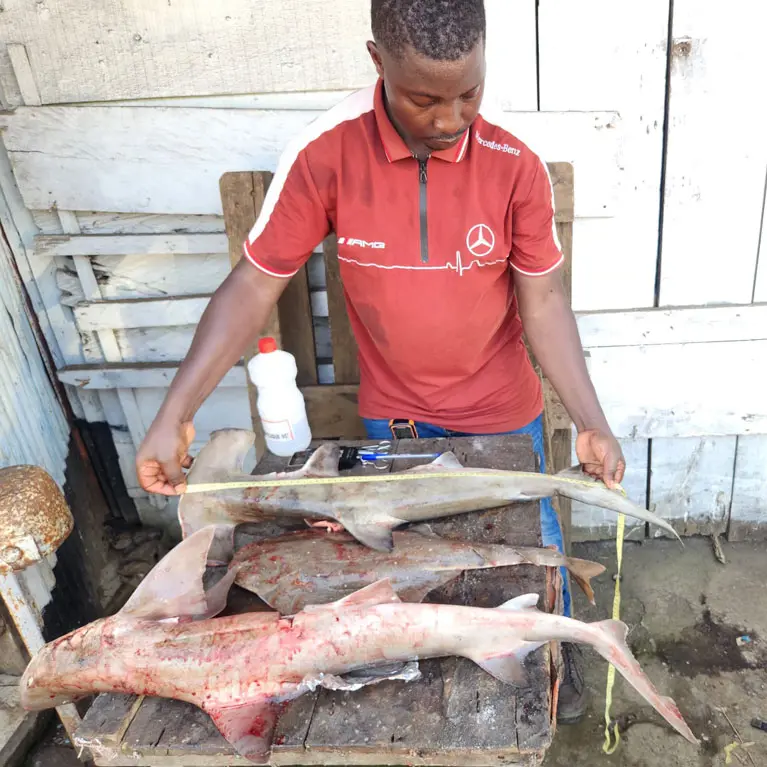Making fisheries sustainable for scalloped hammerhead sharks in Cameroon
Wongibe is on a mission to reduce the bycatch of scalloped hammerhead sharks in targeted fishing areas by 20%. He has set out to identify and map bycatch hotspots, decipher the age structure of scalloped hammerhead populations by analysing vertebrae and dorsal fin samples, and investigate the levels of metals and pollutants in the sharks’ tissues. This is critical work because fishing is a primary livelihood for many coastal Cameroonian communities: fisheries bring economic stability and food security. But the endangered status of many species threatens the sustainability and security of coastal livelihoods. Training workshops to promote sustainable fishing practices and raising awareness of conservation issues are a key part of the project.
Born in the Western Grassfields of Cameroon, I grew up in Bafoussam, the capital city of the West Region. Bafoussam is 35 kilometres (22 miles) from the University of Dschang, where I obtained my BSc in zoology in 2016 and MSc in wildlife resource management in 2020. At the age of 17, I became interested in aquatic organisms but knew little about sharks and rays, not to mention swimming. At the university, I noticed that most of my academic seniors and peers weren’t very interested in research into the marine environment and organisms, but that did not change...


Entangled in the depth: Age structure, Bycatch, and Potential Pollutants in Cameroon sharks and rays
The primary objective is to ensure the long-term conservation of scalloped hammerhead shark populations in Cameroon’s coastal waters by reducing bycatch rates by 20% within a year, while engaging with local fishing communities about sustainable practices and identifying potential pollutants in sharks and rays.
Sharks and rays play a vital role in maintaining healthy marine ecosystems, but are faced with significant threats from overfishing, bycatch and pollution, which contribute to their endangered status. This project addresses these conservation challenges by promoting sustainable fishing practices and gathering essential data to inform conservation efforts, ultimately protecting these species and their habitats.
Sharks and rays are species of significant ecological importance, playing a vital role in maintaining marine ecosystem health. In the coastal waters of Cameroon, where fishing is a primary means of earning a living for many communities, the scalloped hammerhead shark Sphyrna lewini faces severe threats from overfishing and habitat degradation. The high demand for shark fins, driven by traditional practices in East Asia, has led to unsustainable fishing practices that jeopardise not only shark populations, but also the broader marine environment.
In Cameroon, the fishing industry is essential for both economic stability and food security. Yet the lack of awareness about sustainable fishing practices contributes to the decline of vulnerable species like the scalloped hammerhead. Local fishers often unintentionally catch these sharks as bycatch, which can lead to significant population declines. Communities rely on these waters for their source of protein and livelihoods, creating a critical need to balance economic activities with conservation efforts. The situation is compounded by the species’ low reproductive rates, as they typically produce only a few pups per litter, making recovery from overexploitation increasingly unlikely.
This project aims to address these urgent conservation challenges by implementing a targeted approach that engages local fishing communities. By identifying key bycatch hotspots and understanding the factors contributing to bycatch, we can develop effective strategies for reducing shark mortality. Through tissue sampling and data collection, we will assess the health of scalloped hammerhead populations and evaluate the impact of pollutants on their well-being.
By fostering collaboration between researchers and local communities, this project aspires to promote sustainable fishing practices that benefit both shark conservation and the livelihoods of those who rely on these vital marine resources. Ultimately, this initiative aims to create a sustainable future for the scalloped hammerhead shark and the marine ecosystem it inhabits.
- To achieve a 20% reduction in the bycatch rate of scalloped hammerhead sharks in targeted fishing areas.
- To identify and map at least 10 bycatch hotspots using fisher interviews and monitoring surveys.
- To analyse 216 thoracic vertebrae and dorsal fin samples to understand the age structure of scalloped hammerhead populations.
- To evaluate the concentrations of metals and organic pollutants in muscle and liver tissues using advanced analytical techniques.
- To conduct training workshops to promote sustainable fishing practices and increase awareness of conservation issues.
- To prepare reports and outreach materials for sharing our findings with stakeholders.

